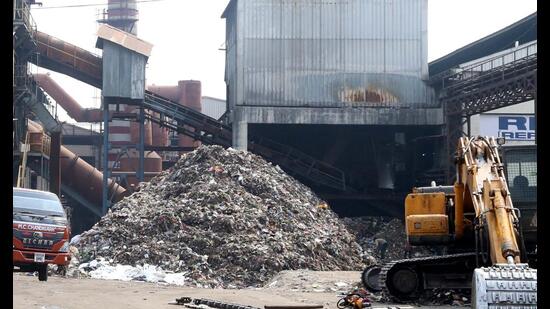Chandigarh MC doubles wet waste processing capacity in a month
In a major turnaround in solving the Chandigarh’s long-standing waste management woes, daily processing of wet waste at the solid waste processing plant in Sector 25 has doubled from 60 metric tonne (MT) to 120 MT in the span of a month
In a major turnaround in solving the city’s long-standing waste management woes, daily processing of wet waste at the solid waste processing plant in Sector 25 has doubled from 60 metric tonne (MT) to 120 MT in the span of a month.

Chandigarh produces 350 MT of wet waste on daily basis. For several years now, MC had been dumping most of it without processing at the Dadumajra dumping site. Poor waste management also pushed city down the Swachh Survekshan rankings.
Even after it took over the plant from Jaypee Group in 2020, reasoning that the group was able to process only minimal waste, MC was not being able to fix the problem. It is only in the last couple of months after MC decided to change its strategy, that processing has started to come back on track.
On the turnaround, MC commissioner Anindita Mitra said, “We realised that we were processing hardly 70 MT wet waste per day and started investigating what the problems were.”
As a first step, MC transferred the operation of the plant to engineering department from medical officer of health. “We shifted the plant from MoH wing which is headed by a doctor to the engineering wing, which has better technical know-how.” MC discovered that it was not being able to deliver good quality segregated waste to the plant, so it started focusing on door-to-door segregation. It zeroed down on areas where the waste was not being segregated and along with a drive of imposing fines on violators, it also stepped up awareness campaigns.
MC has tied up with Chandigarh University, wherein more than 200 students are going from door-to-door to spread awareness on the issue. Resident welfare associations and local councillors are also being roped in for the awareness campaigns. To facilitate better segregation, MC also shifted from two-bins for dry and wet waste to four-bins, two additional ones for hazardous waste and sanitary pads.
On the processing side, “We realised that space was a major constraint, as wet waste needs to be spread out to lose moisture. Hence, we did a tender of clearing the whole area of the unprocessed waste lying there. This shall be completed in the next 20 days and our capacity will further go up,” said Mitra. Under the project, nearly 300 MT of legacy waste will be removed from the plant. “As of now, we have reached a capacity of 120 TPD. Very soon, we shall be at 200 TPD,” said Mitra.
BOX: DRY WASTE WOES
MC is yet to resolve the issue of processing of dry waste. Nearly 200 MT of dry waste is generated daily in the city. While the MC plans a new plant with latest technology, in the meantime, it has floated a tender for the repair of the existing plant. With this, dry waste capacity will shoot up to 150-200 TPD, said Mitra.
MC will spend around ₹6 crore on it and the repair work is likely to be completed in six months. “It will take more than 2.5 years for the new plant to become fully operational. In the meantime, we cannot continue to dump unprocessed waste at Dadumajra. So, the existing plant is being repaired,” said a senior MC official.





